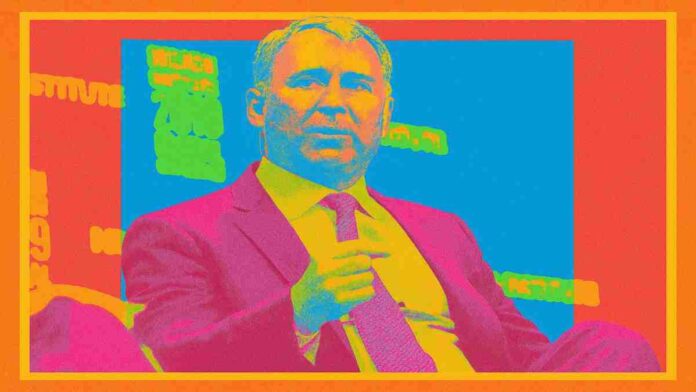In the high-stakes world of hedge funds and global markets, few names evoke as much awe—and occasional controversy—as Kenneth Griffin. At 56, the founder and CEO of Citadel has transformed a modest college hedge fund into one of the most profitable investment firms in history, managing $69 billion in assets as of September 2025. With a personal net worth estimated at $42.2 billion, Griffin ranks as the 34th-richest person on the planet, according to Forbes’ March 2025 figures. But beyond the billions, Griffin’s story is one of relentless innovation, quantitative precision, and a knack for turning market chaos into opportunity. He’s not just a trader; he’s a legend who redefined how the world invests.
From Boca Raton to Black Monday: The Making of a Prodigy
Born on October 15, 1968, in Daytona Beach, Florida, Kenneth Cordele Griffin grew up in a middle-class family with a twist of inherited ambition. His father managed projects for General Electric, while his grandmother, Genevieve Huebsch Gratz, passed down an oil business, farms, and a seed company—seeds, perhaps, of Griffin’s entrepreneurial spirit. Raised in Boca Raton after stints in Texas and Wisconsin, young Ken was a math club president at Boca Raton Community High School. He even ran a discount mail-order software firm called EDCOM from his bedroom, foreshadowing his future in high-tech finance.
Griffin’s epiphany came at Harvard, where he enrolled in 1986. Intrigued by markets, he began trading convertible bonds from his dorm room in Cabot House. To get real-time quotes, he defied campus rules by installing a satellite dish on the roof—a bold move that paid off during the 1987 Black Monday crash. Shorting stocks, he turned a $265,000 fund (seeded by family and friends) into quick profits. By graduation in 1989 with an economics degree, Griffin had honed a quantitative edge, blending math, data, and instinct.
Post-Harvard, he joined Chicago’s Glenwood Capital Investments under Frank Meyer, who gave the 21-year-old $1 million to trade. Griffin delivered a stunning 70% return in a year. Emboldened, he struck out on his own.
Founding Citadel: A Quantitative Revolution
In 1990, at age 22, Griffin launched Citadel LLC with $4.6 million in assets, including Meyer’s backing and funds from Julian Robertson’s Tiger Management. From a cramped Chicago office, he pioneered a multi-strategy approach: equities, fixed income, commodities, and credit, all powered by emerging algorithms and data analytics. Unlike star-trader funds, Citadel emphasized teams of quants, engineers, and researchers—over 3,000 today, with 265 PhDs across 60 fields.
The early years were meteoric. Citadel returned 43% in 1991 and 40% in 1992. By 2003, at 34, Griffin was the youngest on Forbes’ 400 list with $650 million. He spun off Citadel Securities in the early 2000s, creating a market-making powerhouse that now handles one in five U.S. stock trades, using algorithms for lightning-fast liquidity.
Griffin’s strategies? A mix of tactical agility and long-term vision. Citadel thrives on volatility—snapping up distressed assets like Amaranth Advisors’ positions in 2006 at fire-sale prices. It’s heavily tech-forward, with top holdings like NVIDIA for AI bets and Hess Corp. for energy plays. As Griffin puts it, “We relentlessly seek better ways,” reimagining models to outpace rivals.
Navigating Storms: Triumphs and Trials
No legend avoids tempests, and Griffin’s come in waves. The 2008 crisis hammered Citadel—leveraged 7:1, its funds plunged 55%, losing hundreds of millions weekly. Griffin locked investor gates for 10 months, drawing fire for prioritizing survival over liquidity. Yet he rebounded spectacularly: 62% gains in 2009, followed by record revenues. By 2022, Citadel generated $28 billion in profits—the industry’s best year ever—returning $16 billion to clients.
The 2021 GameStop saga was Griffin’s most public crucible. Citadel Securities, handling Robinhood’s order flow, faced conspiracy claims amid the meme-stock frenzy. Griffin bailed out Melvin Capital with $2 billion but testified before Congress, denying conflicts. An SEC probe cleared the air, but it spotlighted high-frequency trading’s grip on markets.
Through it all, Citadel’s model—diffuse teams managing semi-autonomous portfolios—has endured, accounting for 30% of hedge funds’ stock footprint. Griffin’s personal haul? Earnings topped $1.8 billion in 2020 alone, fueled by retail trading booms.
The Philanthropist and Collector: Beyond the Billions
Griffin’s fortune isn’t just hoarded; it’s deployed. He’s donated over $2 billion via Griffin Catalyst, targeting education, economic mobility, and medical breakthroughs. Highlights include $300 million to Harvard (renaming its Graduate School of Arts and Sciences in 2023), $400 million with David Geffen to Memorial Sloan Kettering for cancer care, and $125 million to the University of Chicago’s economics department. During COVID-19, he funneled millions to schools, vaccines, and research.
Art and real estate reveal his eclectic side. His collection—valued near $800 million—boasts Cézanne’s Curtain, Jug and Fruit Bowl ($60 million), de Kooning’s Interchange ($300 million), and a $44.6 million Stegosaurus skeleton (“Apex”) in 2024. Properties? A $1 billion portfolio, including NYC’s record $238 million penthouse and Miami’s priciest estate.
Politically, Griffin’s a conservative force: $75 million to GOP causes in 2024, backing Nikki Haley and Ron DeSantis, while fighting Illinois’ “fair tax.” He’s clashed with Harvard over campus protests and critiqued Trump’s tariffs.
Legacy: The Enduring Griffin Touch
Today, from Citadel’s Miami HQ (relocated in 2022), Griffin oversees a firm that’s “the most successful investment firm of all time,” per LCH Investments. Recent moves include new Boston offices and crypto explorations via stakes in Coinbase and Binance. On X, chatter buzzes about his views on gold as a dollar hedge amid debt woes.
Griffin’s wisdom? “The world favors domain experts who hustle,” he told students. From dorm-room gambles to global dominance, he’s proven it. As markets evolve—with AI, quantum bets, and volatility—Ken Griffin remains the ultimate player, turning “what if” into billions. In trading’s pantheon, he’s not just a legend; he’s the blueprint.
Disclaimer
The content on MarketsFN.com is provided for educational and informational purposes only. It does not constitute financial advice, investment recommendations, or trading guidance. All investments involve risks, and past performance does not guarantee future results. You are solely responsible for your investment decisions and should conduct independent research and consult a qualified financial advisor before acting. MarketsFN.com and its authors are not liable for any losses or damages arising from your use of this information.





